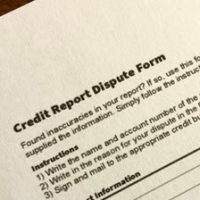What Should I Do If My Credit Report Has Errors: Understanding The FCRA

Your credit report is one of the most important financial documents in your life. It influences whether you qualify for a mortgage, can rent an apartment, or, in some cases, get a job. But what happens if the information on your credit report is wrong? In many cases, credit report errors are more common than a lot of people realize. According to some studies, one in five Americans has at least one mistake on their credit report. These mistakes can have devastating consequences if they are left unchallenged.
There is some good news, however. You are not powerless. The Fair Credit Reporting Act (FCRA) is a federal law giving you the power to dispute errors on your credit report and hold credit reporting agencies accountable for mistakes. Below, we’ll discuss the law and how it applies to various situations.
Common credit report errors
Errors can happen for numerous reasons. Clerical mistakes and identity theft are two of the more common reasons that errors occur. Some of the more frequent issues with credit reports include:
- Accounts that don’t belong to you (often the result of identity theft or mixed files)
- Incorrect payment history, such as showing late payments when you paid on time
- Closed accounts reporting as still open
- Duplicate accounts inflating your debt load
- Outdated negative information that should have been removed
Even a single error can cause your credit score to drop significantly. This will raise interest rates or lead to denials for loans.
Your rights under the FCRA
The FCRA gives you several important protections. These include:
- The right to accuracy – Credit reporting agencies must ensure the information that they report is correct.
- The right to dispute – If you find an error, you have the right under federal law to challenge it.
- The right to an investigation – Once you file a dispute, the credit bureau must investigate it, usually within 30 days.
- The right to correction or deletion – If the information cannot be verified, it must be corrected or removed.
- The right to damages – If agencies or furnishers of information willfully ignore your rights, you may be entitled to financial compensation via a lawsuit. This includes statutory damages and attorney fees.
How to dispute an error
If you spot a mistake on your credit report, you should act quickly.
- Request your reports – You are entitled to a free credit report every year from each of the three major bureaus (Experian, Equifax, and TransUnion) at AnnualCreditReport.com.
- Gather documentation – Collect your bank statements, payment confirmations, or correspondence that support your claim.
- File a written dispute – Submit a letter to the credit bureau that details the error and include copies of supporting documents. You always want to keep a copy for your records.
- Follow up – The bureau must respond, typically within 30 days. If the information is inaccurate, they must correct it.
Talk to a Dayton, OH, FCRA Lawyer Today
Kohl & Cook Law Firm, LLC, represents the interests of individuals with inaccurate information on their credit reports. Call our Dayton FCRA lawyers today to schedule an appointment and learn more about how we can help.
